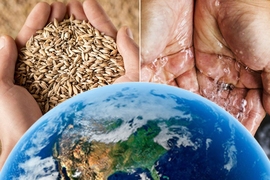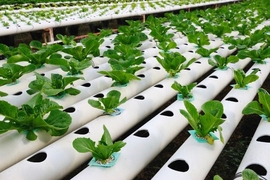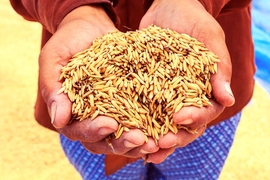MIT faculty, staff, and students gathered at the Wong Auditorium, accompanied by many representatives of member companies of the MIT Industrial Liaison Program (ILP) and other attendees from the corporate and nonprofit sectors, for the Abdul Latif Jameel World Water and Food Security’s first major event, on April 27 and 28. Co-sponsored by ILP and organized around a theme of innovation and collaboration, the conference highlighted the growing need for creative, cross-sector problem-solving to address significant food and water security issues around the world.
As the challenges involved in providing safe and sufficient supplies of food and water to an ever-growing and increasingly urban world population multiply, multisector partnerships and collaborations are becoming increasingly important for addressing system-level issues, as well as promoting the development and adoption of new technologies.
Following opening remarks by Abdul Latif Jameel World Water and Food Security (J-WAFS) director John Lienhard, who introduced J-WAFS as MIT’s Institute-wide initiative to coordinate and lead research related to water and food, keynote speaker Ralph Jerome, vice president for innovation for Mars, Inc., noted the significant role that the agriculture sector plays in climate change and how “uncommon collaborations” can help address the system-level challenges we face.
“Food and agriculture are not only a major contributor to climate change but probably also one of the areas that will be most hit by it,” he noted. “While innovation is important to sustain a business, it’s also crucial in a world facing the grand challenges of feeding a growing population, apportioning ample fresh water to all, bringing degraded lands back to production, decreasing food waste, and creating civilization that's resilient to climate change.”
J-WAFS organized the day-and-a-half program, which highlighted innovative water, food, and agriculture technologies under development at MIT, including current research by MIT faculty as well as numerous startups with MIT affiliations.
Professor Christopher Voigt of the Department of Biological Engineering, for instance, presented his J-WAFS-funded research on transferring the nitrogen-fixing capabilities of legumes to cereal grain crops. Currently, grain crops — particularly rice, wheat, and corn — require the addition of nitrogen to the soil, resulting in environmental impacts in places like North America, where over-fertilization can lead to problems such as algal blooms, as well as dramatically lower crop yields in places like Africa, where chemical fertilizer is beyond the economic reach of many farmers. Noting that this challenge was identified as far back as the late 1970s as “one of the two biggest problems for genetic engineering to solve,” he described recent advances in his lab that have addressed some of the most significant technical hurdles.
Karen Gleason, associate provost and the Alexander and I. Michael Kasser Professor in the Department of Chemical Engineering, addressed the challenge of food- and water-borne pathogens, noting that the World Health Organization estimates that one in 10 people worldwide fall ill every year from eating contaminated food, and 420,000 deaths are attributed to these pathogens. Using chemiresistor technology that her lab has developed for a variety of applications, she is developing biosensors that can detect pathogens in food in real-time using quick and easy sample preparation. With a very low detection limit, this technology would represent a significant improvement over conventional methods.
Two other keynote speakers addressed the need to connect appropriate technologies to markets. “How do you connect the technology to the market in order to get the innovation to the end user?” asked Kavita Prakash-Mani, who is leading Grow Asia, a new initiative of the World Economic Forum. She described the agriculture sector as the “largest economic driver globally, with the largest environmental impact from any sector, and also the biggest social impact given the number of people working in it.” Yet the majority of the world’s 550 million farmers are smallholder farmers, and many of them are chronically hungry themselves. Noting that farmers can be very averse to change, she emphasized the need to work collaboratively with them to design and implement new technologies.
In addition to innovation and technology development, the conference also featured a panel addressing “Risk and Resilience in an Era of Globalization and Climate Change.” Moderated by Steve Polski, senior director and general manager for Cargill’s Responsible Supply Chains Joint Advisory Business, the panel featured professors and researchers from MIT who address various threats to the world’s agriculture and food supply chains.
Colette Heald, the Mitsui Career Development Associate Professor in the Department of Civil and Environmental Engineering, who also holds an appointment in the Department of Earth, Atmospheric and Planetary Sciences, talked about the impact of both air pollution and climate change on future crop yields, and stressed the need for better environmental monitoring to understand the risks. Retsef Levi, a professor in the MIT Sloan School of Management, addressed food safety as a supply chain issue, and Alexis Bateman, director of MIT’s Responsible Supply Chain Lab, emphasized the importance of bringing more transparency and honesty to international supply chains in order to help companies control risk related to supply, reputation, and environmental impact.
Addressing a question to the panel about how education and research can help reduce corporate and social risk, Levi stressed the role of MIT’s industry connections in taking research to the field, and all panelists agreed about the importance of interdisciplinary research and the need to pursue research related to real-world issues.
The conference also featured a keynote by Tim Prewitt, executive director of International Development Enterprises (iDE). Kicking off a panel on agricultural technologies, he noted that the extremes in crop productivity across the world suggest huge opportunities to grow more food with improvements in technology and farming methods — particularly in places like Sub-Saharan Africa, where soils are depleted, there is only rain-fed irrigation, and crop yields are lowest. Addressing the need for innovation in business markets as well as technology, he noted that the “single biggest consideration is how to get products to market quickly and cheaply.”
That is also the interest of the many startup companies that participated in the conference’s startup showcase. Conference attendees had the opportunity to talk with representatives of nearly two dozen companies. Some, such as the young agricultural drone company Raptor Maps, were only recently started by MIT students, and others, such as Desalitech, a company offering large-scale water purification and desalination technology, already have substantial capitalization and business volume. Desalitech is currently licensing several patents pertaining to desalination, low-energy deslination, and membrane technology from MIT.
Commenting on J-WAFS’ role at MIT, director John Lienhard described one of its programs, J-WAFS Solutions, which supports the commercialization of MIT technologies and provides support and mentorship for MIT faculty and students around food and water innovation and entrepreneurship. “We heard over and over at the conference about the importance of not just innovating, but building successful companies, enterprises, and collaborations that enable those innovations to make a difference in the world,” he said. “The success of this conference signals the growing interest the MIT community has in applying MIT’s excellent track record in this regard to our food and water security challenges.”









